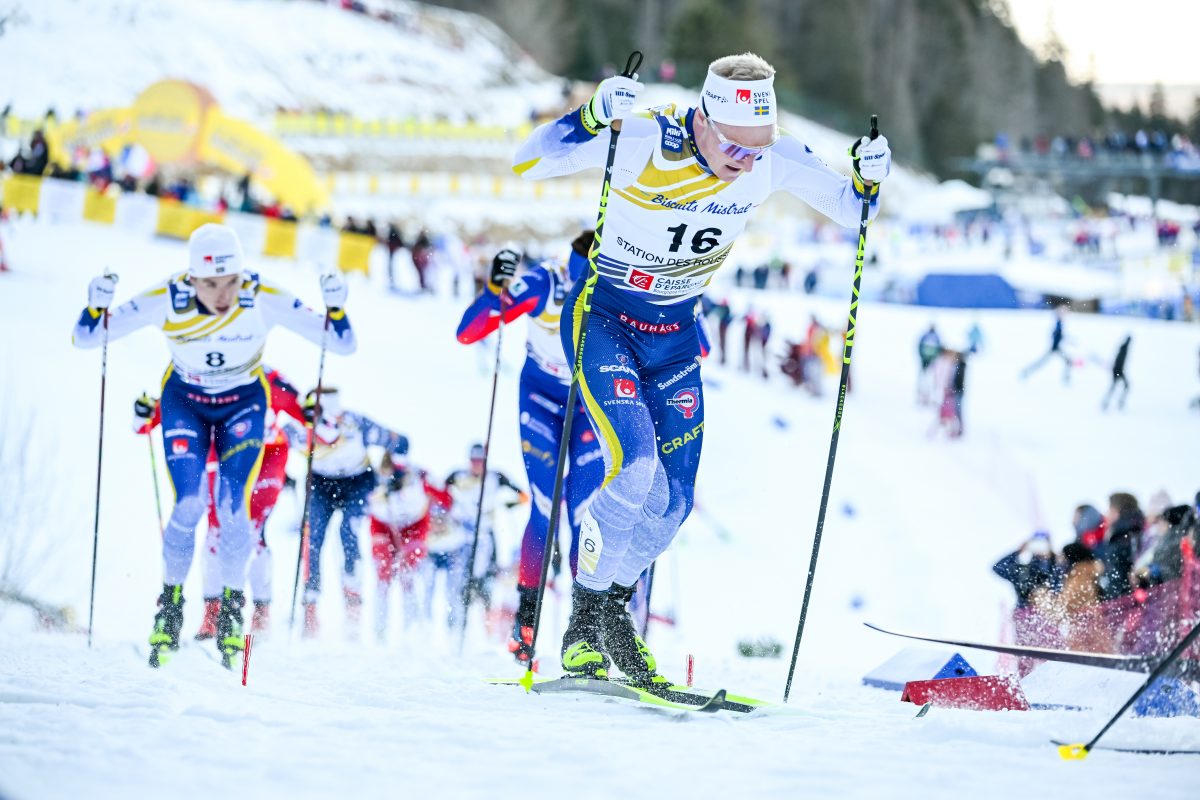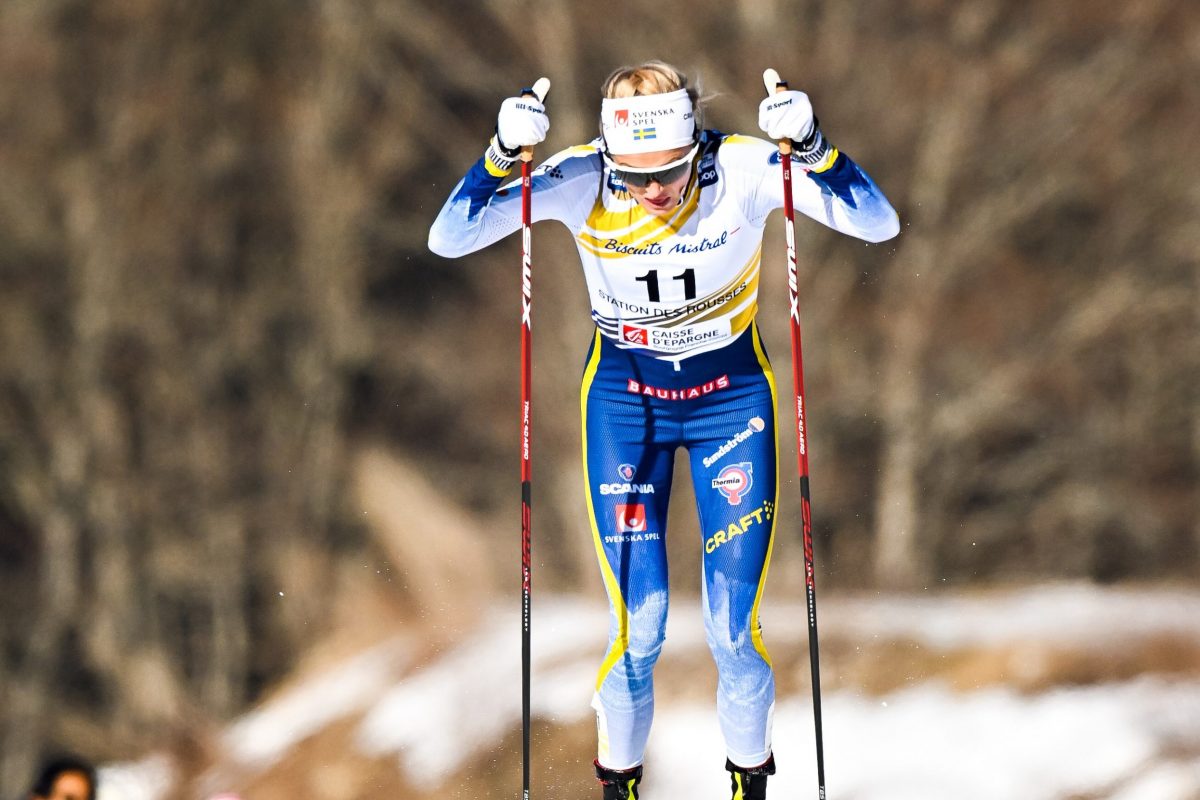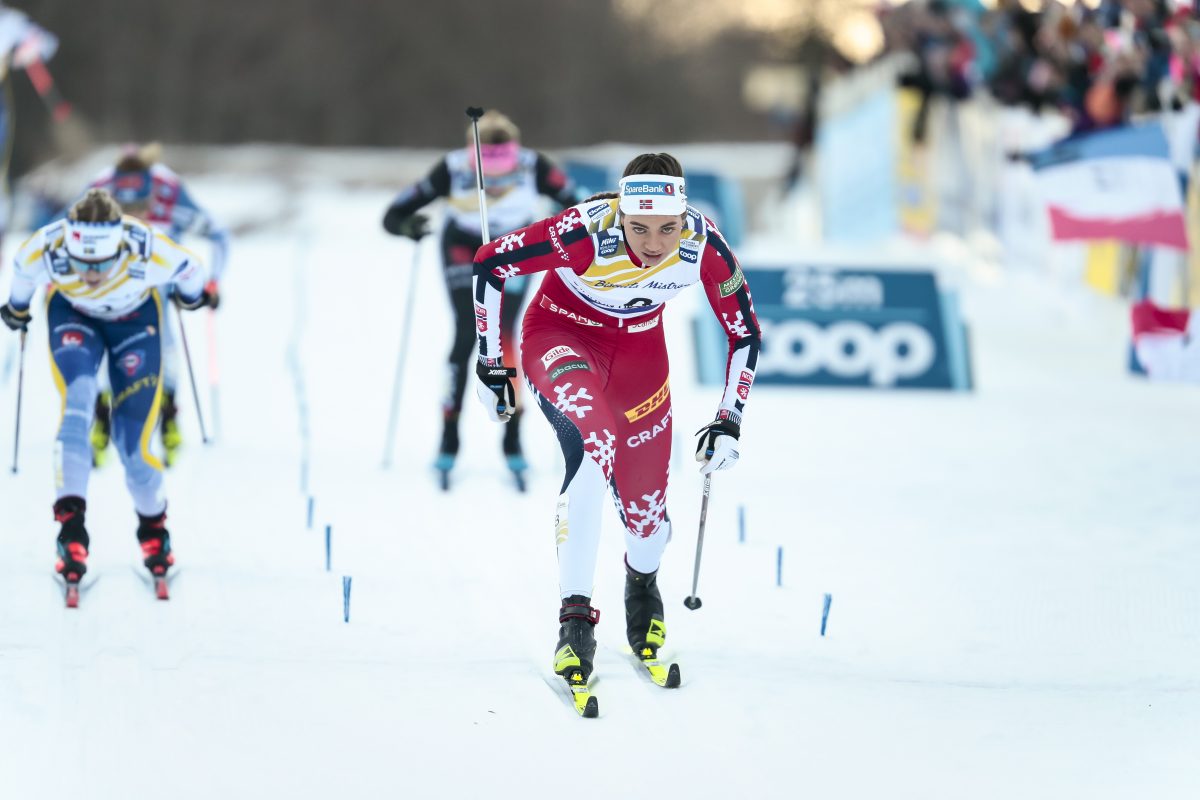
Friday: 10/10 kilometer individual start classic.
The racers that previewed the Bond Brooks 5km course in Augusta, Maine, Thursday afternoon encountered icy conditions and wickedly fast downhill turns. Fearing more accidents (a UNH skier broke his finger) and build-ups over numerous laps on the icy terrain, the second section of the course was cut and a 3.3km lap was decided.
But the forecasted 2-4 inches of snow turned into 8-10, as the snow started early in the morning and did not let up until late evening. By the next day’s races the same track was transformed into ankle-deep powder which the racers groomed themselves by each racing three laps of the 3.3k loop.
The course location is as interesting as its terrain: set next to a flight school in Maine’s capitol city, you first have to drive through a long cemetery and down a steep one-lane grade to get to the trail head. The homologated courses, designed by Morton Trails, wind through the woods and over streams and cross through a stadium near the parking lot between loops through the woods, giving spectators a good view of the action.
Friday’s heavy snowfall made visibility as tough as the terrain, but the top racers had tougher mindsets.
The Dartmouth men took the day’s race, led by senior Nils Koons. Koons wasn’t bothered by the deep snow.
“It was pretty crazy conditions, but the course sort of suits the conditions, kind of up and down and all over the place. . . I sort of enjoyed the whole thing, actually – it was a bit of a rollercoaster.”
The Dartmouth team did not actually get to preview the race course on Thursday, but Koons thought the dramatic change in conditions overnight may have worked to his team’s benefit.
“We had no idea what the course was,” noted Koons, but then laughed, “it might have been an advantage, huh?!”

UVM’s Franz Bernstein was just nine seconds back to Koons for a second place finish. Bernstein, who took a first and second at NCAA’s last year, has been slowly coming back into form over the last two weeks of racing.
In 3rd and 4th place, Dartmouth teammates Eric Packer and Sam Tarling rounded out the top men’s team score.
Dartmouth men’s coach Ruff Patterson was pleased with the team’s result, but did not want his team to rest on it’s current success, pointing to the fact that UVM’s Bernstein would “only get stronger” and Scott Patterson would be returning from World Juniors soon.
“This group is a pretty solid group all around, and when things go right, they go right,” said Patterson of his men’s team,“but UVM is definitely going to be there as time goes on. Things went great today, but it’s not going to be like this all winter.”
UVM and UNH dominated the women’s classic race, led by UVM’s Lucy Garrec who took the field by 15 seconds. Garrec, who did not race last weekend due to shoulder problems, said that she was just hoping to “get back into racing”, but after receiving fast splits on her second lap she was pushed to keep up her fast first lap pace. Garrec said she enjoyed racing in such wintry conditions, but noted that she had had to reroute her mentality from Thursday’s course preview.
“We skied the first course yesterday and everyone was a little distracted with the “S” turns and all these crazy things, but it was a different day today and when we skied it this morning it was a different course.”

Stephanie Crocker, in 2nd place, was missing some of her teammates who are traveling for races overseas, and was Dartmouth’s lone woman in the top ten. Crocker said the conditions really suited her.
“I kind of like the adventure feel, when it’s like a blizzard, it feels more like back-country skiing almost, so that was really fun.”
Crocker, who was 15 seconds behind Garrec, put another 37 seconds between her and the third place finisher. Anja Gruber, of UVM, was 3rd, followed closely by 4th place Natasha Kullas and 5th place Clare Egan of UNH.
Saturday: Team Relays.
Fridays’ slew of snow had a chance to set up over a cold and clear night in preparation for a day of team relays. The race format: Skate technique, three person teams, each leg completing two laps of a 3.3k course.
Both men’s and women’s races were hotly contested between the top two teams.
In the women’s race, it was Dartmouth vs. UNH.
Dartmouth’s Rosie Brennan looked to be on a mission as she charged the first lap to put her team ahead, and UNH’s Clare Egan tried to hold on, but was gapped by 22 seconds at the tag zone.
This was the first solid showing for Brennan, who is coming back from spring knee surgery and a slight concussion she suffered during a car accident earlier this winter. Brennan said that she hoped the speed she felt in her fast relay split would continue to be an upward trend, remarking of her journey back into full health, “It’s been a bumpy road.”
Stephanie Crocker was Dartmouth’s second leg, and though she said she gave it her all, she couldn’t ward off the charge by UNH’s Anya Bean. A strong skater, Bean powered the course to overtake Crocker after the first lap and hand off with a small lead to teammate Elizabeth Guiney.

“I was kind of tired,” said Bean, “but I’m really into this course, and I didn’t really empty the tank yesterday, so I knew I just had to go chase Steph down.”
Meanwhile, Crocker handed off to Erika Flowers, also a very strong skate skier, who quickly closed the small gap to Guiney. Guiney led the first lap, after which Flowers took the lead on the second lap and tried to break away several times, but Guiney wouldn’t let go.
“She was sticking right with me,” said Flowers, “so it just came down to the end.”
Flowers and Guiney crested the top of the hill toward the stretch to the finish line together, but Flowers proved to have a little more sprint in her legs and pulled away for the win.
Though victorious this time, Flowers gave a nod to her UNH competitor, who she said she raced with while competing for the Intermountain division.
“I think, you know, any day it could have gone the other way.”
UNH hopes so. Anya Bean points out that her teammates Guiney, Kulles, and Egan are all great sprinters, and will be ready for a rematch during the Middlebury carnival team sprints.
“We have a really deep team, and I think we knew that coming into the fall,” said Bean, of her team’s strong showing in this early season, but adds that their ultimate goal was to race well all season long and qualify four skiers to NCAA’s.
The men’s race was closely contested by UVM and Dartmouth, and again came down to the last 200 meters.
Both of Dartmouth’s first and second relay teams were in the lead on the first lap, Eric Packer and Erik Fagerstrom pulling away for a 34 second lead over UVM’s Fritz Horst. Packer handed off to Koons, who kept up the pace with the help of second-team skier Gordon Vermeer.
As UVM’s second leg, Bernstein continued to show his form by posting the fastest second-leg time and pulling his team closer to contention. He handed off to teammate Alexandar Howe after making up 15 seconds to Dartmouth, but Howe still had his work cut out for him. Howe quickly made up the deficit to Dartmouth’s Sam Tarling, and the two skied together for the rest of the course.

“There’s not a lot of room to pass out there,” said Tarling, “so I figured I needed to stay in front, and I put some moves on where I could, but Alex stayed with me. . .some of the uphills I made some sprints, but he was not moving.”
The race came down to the last half kilometer, when Tarling was finally able to sprint away from Howe without a strong answer. Howe admits that though he was hoping to win the race, the push he made to close the gap at the beginning of the race may have taken too much out of him, and he also had a hard time keeping up with Tarling on the flatter sections of the course.
“I liked the course: I like uphills, I like transitions. It was a lot of fun out there, but the stadium part was really flat, and I think Sam had an advantage there.”
Though they didn’t win the day, UVM Coach Patrick Weaver was positive when speaking to the UVM press about his team’s races.
“We had another good day. It was really nice to see the team perform well two weekends in a row. . . .It was also exciting to see the depth our team has. To perform well without our top three skiers gives us a lift in our confidence as a team.”




